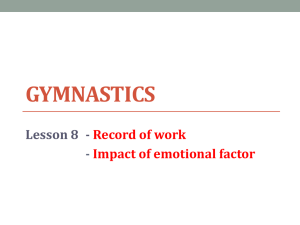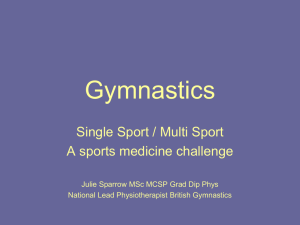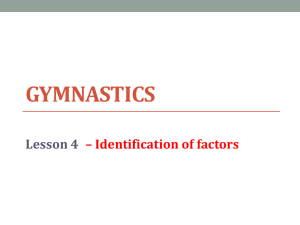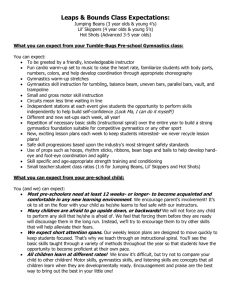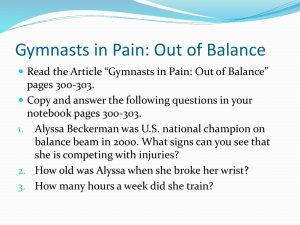LOUGHBOROUGH UNIVERSITY
advertisement
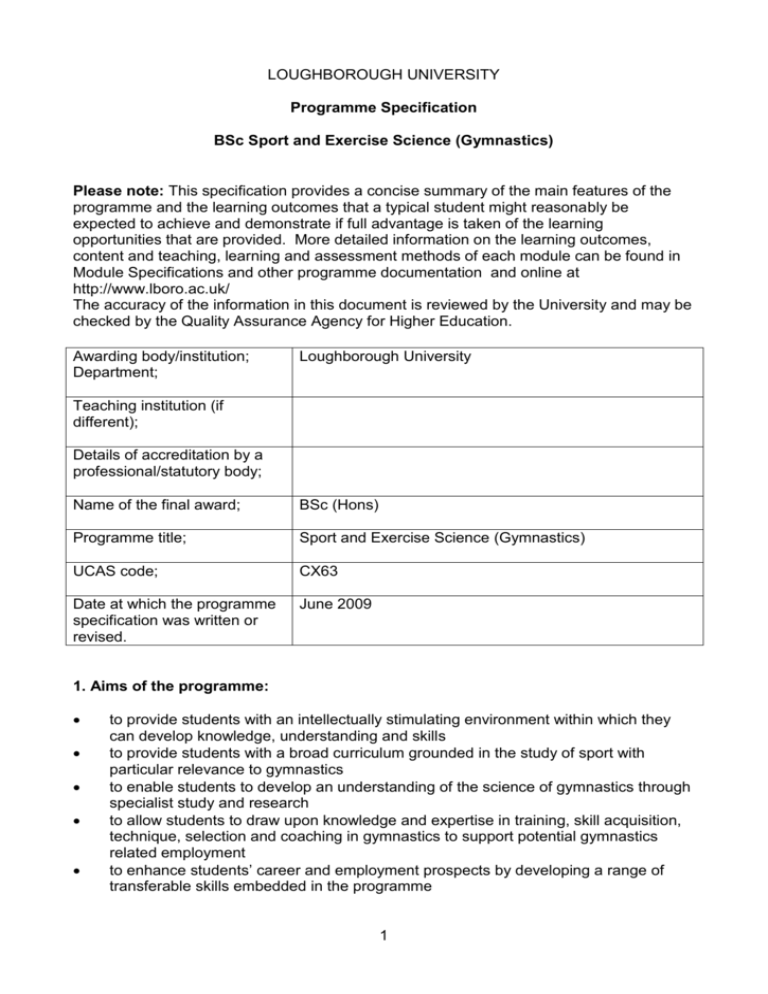
LOUGHBOROUGH UNIVERSITY Programme Specification BSc Sport and Exercise Science (Gymnastics) Please note: This specification provides a concise summary of the main features of the programme and the learning outcomes that a typical student might reasonably be expected to achieve and demonstrate if full advantage is taken of the learning opportunities that are provided. More detailed information on the learning outcomes, content and teaching, learning and assessment methods of each module can be found in Module Specifications and other programme documentation and online at http://www.lboro.ac.uk/ The accuracy of the information in this document is reviewed by the University and may be checked by the Quality Assurance Agency for Higher Education. Awarding body/institution; Department; Loughborough University Teaching institution (if different); Details of accreditation by a professional/statutory body; Name of the final award; BSc (Hons) Programme title; Sport and Exercise Science (Gymnastics) UCAS code; CX63 Date at which the programme specification was written or revised. June 2009 1. Aims of the programme: to provide students with an intellectually stimulating environment within which they can develop knowledge, understanding and skills to provide students with a broad curriculum grounded in the study of sport with particular relevance to gymnastics to enable students to develop an understanding of the science of gymnastics through specialist study and research to allow students to draw upon knowledge and expertise in training, skill acquisition, technique, selection and coaching in gymnastics to support potential gymnastics related employment to enhance students’ career and employment prospects by developing a range of transferable skills embedded in the programme 1 to support the student experience through effective management and improvement of the School’s learning and teaching resources 2. Relevant subject benchmark statements and other external and internal reference points used to inform programme outcomes: Subject Benchmark Statement (Unit 25 : Hospitality, Leisure, Sport and Tourism) The Framework for Higher Education Qualifications (2001) University Learning and Teaching Strategy (2002-2005) (http://www.lboro.ac.uk/admin/ar/policy/learning_and_teaching) School Learning, Teaching and Assessment Strategy Research interests and specialisms of teaching staff and their professional involvement in the disciplines Centre for Gymnastics Research activities (http://www.lboro.ac.uk/departments/sses/research/biomechanics/centreforgymres.htm) 3. Intended Learning Outcomes Knowledge and Understanding: On successful completion of this programme, students should be able to demonstrate: an ability to reflect critically upon approaches to the acquisition, interpretation and analysis of information in a variety of sport contexts their knowledge and understanding of sport-related behaviour through critical evaluation of both academic and professional practices an understanding of human structure and function with reference to sport from the study of anatomy, physiology, biomechanics, psychology, motor learning and motor control an ability to appraise and evaluate the effects of applied sport science on the elite gymnast an understanding of the requirements needed for the performance of gymnastics in comparison with other sports from the perspective of various sports science disciplines Teaching, learning and assessment strategies to enable outcomes to be achieved and demonstrated: Modules within the Gymnastics Pathway adopt strategies for learning and teaching to support the knowledge and understanding to be acquired. It is appropriate that a broad range of learning and teaching methods should be utilised. Lectures are valuable for outlining the key aspects of a topic and providing a structure for independent study. Small group seminars explore topics in greater depth and reinforce key principles and core knowledge. Laboratory classes provide an opportunity to learn through practice, to test theories and acquire and refine recording skills. Practical sessions are presented in a gymnastics context and allow a structured opportunity for critical reflection on practice. Projects provide an opportunity to undertake a detailed examination of a gymnastics issue and to apply and refine skills of information collection and analysis. The methods outlined are indicative rather than exhaustive but serve to emphasise the importance of selecting learning and teaching strategies that best facilitate the achievement of the programme learning outcomes. 2 Assessment is used for diagnostic, formative and summative purposes. Methods of Assessment assist and enhance progress through the provision of feedback and provide opportunities to demonstrate acquisition of knowledge and understanding relating to the Gymnastics Pathway. Example assessment methods include: examinations, coursework tests, written assignments, laboratory reports, research reports, seminar papers and group assignments. Skills and other attributes: a. Subject-specific intellectual/cognitive skills: On successful completion of this programme, students should be able to: reflect critically on the central themes and issues in modules within the Gymnastics Pathway critically assess and interpret research studies in gymnastics critically asses the various limiting factors for elite sport performance in general and gymnastics in particular relate theory to practice in the various disciplines as applied to gymnastics apply knowledge to solve problems related to technique, training and coaching in gymnastics Teaching, learning and assessment strategies to enable outcomes to be achieved and demonstrated: A variety of teaching situations, for example, laboratory classes and seminars, and assessment methods, such as seen/unseen examinations, coursework papers and oral presentations, promote the acquisition of intellectual/cognitive skills. Intellectual/cognitive skills are developed progressively through the programme (re. Subject Benchmark Statement, Performance Indicators, pgs 11-12) and are stated explicitly in threshold definitions (ref Programme Handbooks) which define criteria for the award of marks. Students are provided with feedback on assessed work, both formative and summative, either individually or collectively, to help them to achieve such skills. b. Subject-specific practical skills: On successful completion of this programme, students should be able to plan, design and execute a sustained piece of independent research on gymnastics plan, prepare and present appropriate methodologies for the development of gymnastics performance coach and manually support basic gymnastic skills Teaching, learning and assessment strategies to enable outcomes to be achieved and demonstrated: Discipline based skills are developed through the programme; particular modules of which Analysis and Performance in Sport in Gymnastics and Sport and Exercise Pedagogy provide good examples whereby learning and teaching opportunities facilitate the achievement of subject-specific practical skills. Issues of safety are promoted by the 3 demonstration of good practice by teachers (and learners). A comprehensive safety handbook is given to all students as part of an induction programme in their first week in the School. Modules which are practically based are assessed by presentations, laboratory reports, and coursework tests to demonstrate their understanding of skills and concepts. c. Key/transferable skills: On successful completion of this programme, students should have developed competencies in the following generic skill areas: communication numeracy information technology team work problem solving management of self learning (ref. Skills for Success Programme http://www.lboro.ac.uk/service/ltd/services/stud_support/programme.html) Teaching, learning and assessment strategies to enable outcomes to be achieved and demonstrated: Within the Gymnastics Pathway there is variation from module to module in the extent to which key/transferable skills are required. However each student in following a compulsory set of modules (with increasing choice over three years) develops a range of skills in conjunction with academic and professional content knowledge. Skills are promoted and developed in a variety of learning and teaching situations and they are assessed as an integral feature of student work completed, inter alia, for coursework assignments, group presentations and examinations. The School maps the development of transferable skills for each module from one year to the next to ensure that students exit their programme appropriately skilled. 4. Programme structures and requirements , levels, modules, credits and awards: 1.1 Administrative responsibility for the programme rests with the School of Sport and Exercise Sciences. 1.2 The programme leads to the Degree of Bachelor of Science. 1.3 The duration of the programme is six semesters. 1.4 Candidates must take a minimum modular weight of 50 in each semester, with a total modular weight of 120 for each year, taking into account both compulsory and optional modules. The modular weight of modules taught over both semesters will be evenly split between semesters. Full details can be found in the programme regulations at : http://lboro.ac.uk/admin/ar/lps/progreg/year/0910/index.htm 4 5. Criteria for admission to the programme: Admission will be based on gymnastics experience as competitor or coach; A-Level subjects appropriate for the study of the required modules: including mathematics, physics, chemistry, biology, computer science and psychology; A-level grades consistent with those required for the BSc (Hons) Sport and Exercise Science. Admissions requirements conform to the “Curriculum 2000” changes, taking account of the new qualifications at AS level, A2, VCE and Advanced Scottish Highers. For entry in 2004 students were asked to achieve a total of 340/360 UCAS points from two subjects at A Level and a third subject at A Level or two subjects at AS Level (not including General Studies), 340/360 points from VCE subjects and DDD from BTEC National Diploma cluster units (http://www.lboro.ac.uk/prospectus/ug/index.htm) 6. Information about assessment regulations: In order to progress through the programme and to qualify for the award of a degree, candidates entering in October 2005 must satisfy the minimum requirements as set out in Regulation XX and the following programme requirement: candidates must accumulate a minimum of 100 credits (out of 120 credits available) at Parts A, B and C, and in addition achieve a module mark of at least 30% in the remaining modules. Candidates’ final degree classification will be determined on the basis of their performance in degree level Module Assessments in Parts B and C. The average percentage marks for each Part will be combined in the ratio Part B 40 : Part C 60, to determine the overall average percentage mark for the programme (the Programme Mark). The classification of degree will be determined by the Programme Mark, boundaries are normally set at 70%+ First; 60%+ Upper Second; 50%+ Lower Second and 40%+ Third http://www.lboro.ac.uk/admin/ar/calendar/regulations/index.htm See Regulation XX Provision will be made for candidates who have the right of re-assessment in any Part of the programme, and have achieved at least 60 credits in that Part, to undergo reassessment in the University’s special assessment period or during the course of the following academic year. Candidates who fail to achieve 60 credits in any Part of the programme must wait until the following academic year to be re-assessed. Reassessment marks are capped at 40% at Parts B and C. 7. What makes the programme distinctive This degree pathway comprises the study of the science of gymnastics from the perspectives of biomechanics, physiology, psychology and pedagogy. The first year modules, which are all compulsory, have been selected to provide the introductory disciplinary knowledge and understanding required for the study of the science of gymnastics. The second year modules, which are all compulsory, have been selected to develop those areas of particular relevance to gymnastics performance and development. The third year modules provide a strong focus on specific applications to gymnastics with a small selection of optional modules. The research project provides an opportunity for students to access the records of British Gymnastics as well as performances of national team members. The module on gymnastics research encompasses the spectrum of 5 disciplines applied to the study of gymnastics together with specific applications of gymnastics coaching. 8. Particular support for learning: For further information please go to: http://www.lboro.ac.uk/admin/ar/templateshop/notes/lps/index.htm 9. Methods for evaluating and improving the quality and standards of learning: For further information please go to: http://www.lboro.ac.uk/admin/ar/templateshop/notes/lps/index.htm June 2009 6
